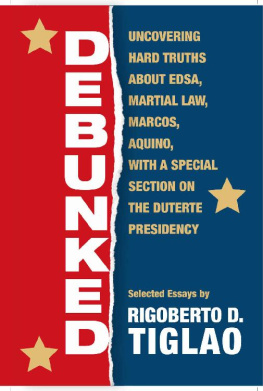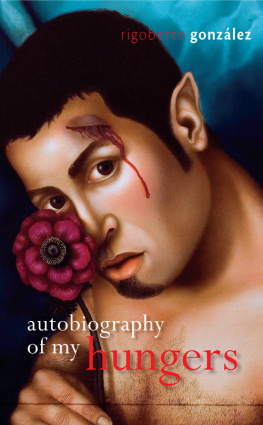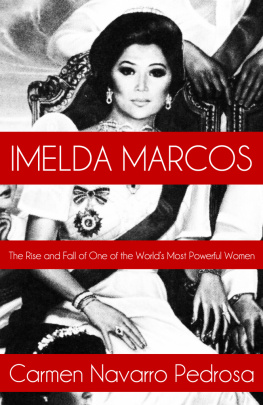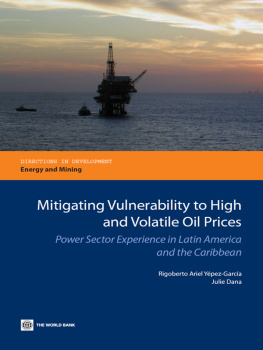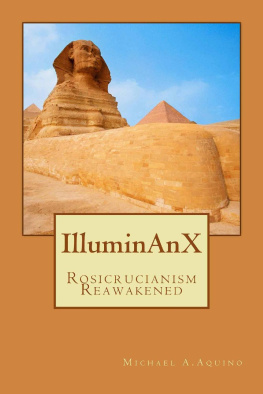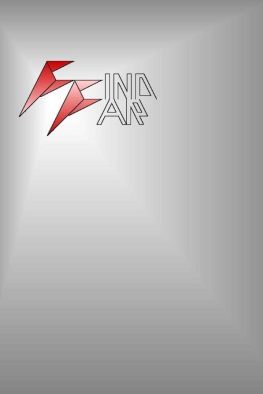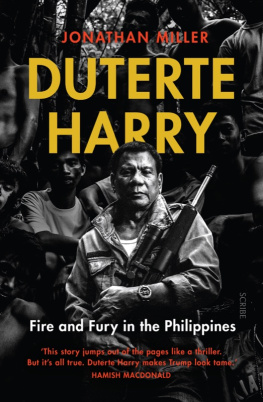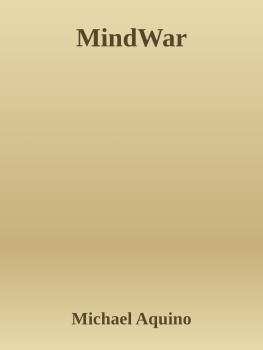The 92 articles in this book were among 872 columns published in the Philippine Daily Inquirer (March 2010 to January 2013) and The Manila Times starting January 2013, except for the essay The Strong Republic which I wrote in 2002 when I was a research fellow at the Kyoto Universitys Center for Southeast Asian Studies.
The columns have been edited and revised for this collection, but some were kept in their original form. Most titles were changed for brevity. I have resisted the temptation to update the articles to reflect current events as I believe the analyses and data I have presented have withstood the test of time.
The dates at the end of each article refer to when it was published. I am proud to say that I was during the past regime among the very few columnists who were not bewitched by the Yellow Cult and were critical of Benigno Aquino IIIs presidency. Subsequent events have proven such views to be correct.
This book would not have been possible without the editorial guidance, editing, and moral support of my dear wife, Getsy, an accomplished journalist herself and currently a Wednesday columnist at the Manila Bulletin.
I am deeply grateful to Dr. Dante Ang, owner and publisher emeritus of The Manila Times and to the Inquirers late Letty Jimenez-Magsanoc for inviting me to write these columns in their newspapers, which have been reincarnated as essays in this collection.
This book is dedicated to my inspiration, my children Ria, Xandro, and Dart and my grandson Ocean.
Introduction
Journalism, it is said, is history in a hurry. Reporters write, as an American editor popularized the phrase in the 1960s, the first rough drafts of history, documenting important events in a nations life, narrating the concerns of its people.
Columnists or opinion writers, however, are a specialized breed of journalists. They also tackle the news but they do one better: they analyze, probe, criticize, berate or praise, harangue when needed, with the intent of helping readers know the meaning and significance of the straight news.
The best columnists in general are former reporters, because of their profession trained to gather facts and glean their meanings. But columnists are not bound by the same convention as reporters. Almost by definition, opinion columnists expound their analyses, their take, their reasoned but personal view on mostly current news developments. They explain what they think a particular issue means for their readers lives, or for the future of their nation.
They have, by nature of their job, a bias for their own perspective and judgment of news events and more so, of the people that are in the public eye.
This is not to say however that columnists can just run roughshod over the facts. Columnists still need to stick to standards of factual accuracy, even as they interpret these events through the prism of their minds formed by their varying education, pursuits, passions, and other life experiences.
I have been lucky to have lived, as they say, a life path less-travelled, from which I have drawn many elements and inspiration for my column writing. My opinion pieces published in the Philippine Daily Inquirer and The Manila Times of which this book contains a sample of, arent in the mold of traditional columns though.
Many are investigative pieces that unearthed information that were unknown to the public before, such as the Indonesian control of our major public utility firms, a subject most in mainstream media wouldnt touch with a ten-foot pole. These columns were the material for my earlier book Colossal Deception.
I have also uncovered through the research for my columns a view of the Marcos era radically different from that I myself had embraced in my younger years and disseminated by the Aquino clans Yellow political cult.
Several of my columns also debunked what have been practically myths of our time, such as the so-called Jabidah Massacre that didnt occur, but served as propaganda weapon for the Liberal Party bent on stopping Marcos from winning a second term in 1969. Another modern-day myth being fostered is that one stormy day, China simply grabbed Panatag Shoal from us, when the fact is that it was Benigno S. Aquino III and his officials who lost it due to their bungling.
I have strived to back up the opinions I have expressed with as much data as I could muster. This empirical bent springs from my early dream to be an astrophysicist: I had entered Ateneo de Manilas honors course as a B.S. Physics major in 1970.
I had thought I could just tinker with the huge telescopes and the devices at the physics laboratory at the Jesuits renowned Manila Observatory. Instead, I found myself struggling in mind-numbing courses such as Multivariable Calculus and Mathematical Logic, which made me conclude that Id never be a physicist.
I had my first dip into the waters of journalism when I wrote several articles in the Ateneos student newspapers. One of my accomplishments when I became a radical (read: communist) activist was getting together with Perfecto Martin Jr. for the literary magazine Heights to be published in Pilipino and renamed Panday. To the horror of our Jesuit overseers, one issue had as its cover in a shade of commie red Nilo Tayag, the chairman of the Kabataang Makabayan, the youth front of the Communist Party, who had just been captured at that time.
I was drawn to the communist movement in 1969, together with my late wife Raquel, a heroine of activists and feminists in that era. After heading its regional Youth and Students Bureau in the early 1970s, I became in 1972 the head of the Communist Partys Manila-Rizal Regional Committee, which post would have made me a member of the Partys purported policy-making body, the Central Committee.
As much as to my background in humanities and science, I owed my initial training and work in journalism to my involvement in the Party, particularly to the ideas of Russian revolutionary Vladimir Ilyich Lenin, founder of the first communist-controlled state on the planet.
Lenin saw newspapers as having a crucial role in the task of fomenting revolution. In a 1901 article, he pointed out: The role of a newspaper is not limited merely to the spreading of ideas, merely to political education and attracting political allies. A newspaper is not only a collective propagandist and collective agitator, but also a collective organizer. Indeed, much of the Bolsheviks success in fomenting revolution and capturing power was through its newspaper founded in 1901, Iskra .

